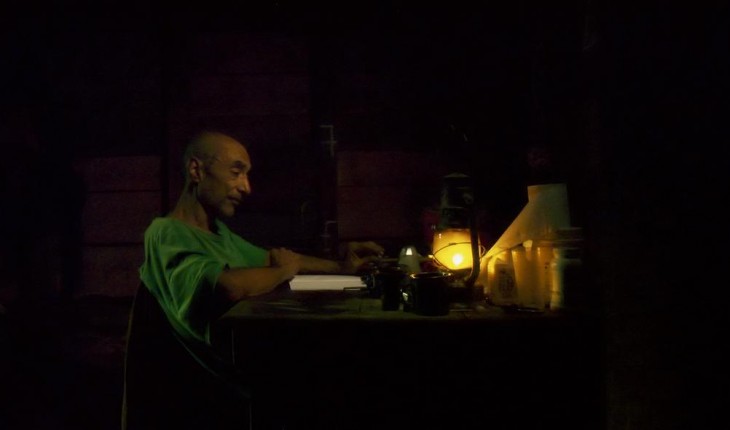Louis Sarno went to record the music of the Central African Republic’s Bayaka community in the 80s and never turned back.
In 2005, Noel Lobley—then a DJ and anthropology graduate from Oxford University—made an astonishing discovery. By sheer fluke, he stumbled across a neglected collection of over 1,000 hours worth of sound recordings of the Bayaka—a hunter-gatherer community in the rainforests of the Central African Republic.
“I found a load of tapes and notes wrapped in a bad jumper in a battered old suitcase in a storeroom in the Pitt Rivers Museum,” Lobley told me. “If anyone had dropped that suitcase, the contents would’ve been unusable forever; we would never have known which note referred to what tape, and it could’ve all just resulted in a random mess.”
Lobley consulted with Hélène La Rue, a music curator at the Pitt Rivers Museum, about his findings. He learned that the collection had been accumulating for two decades, as Louis Sarno, a writer from New Jersey, travelled back from the Central African Republic to Oxford every few years to donate his recordings to the Pitt Rivers Museum for safe-keeping. Lobley recognized Sarno’s name within the field of African sound ethnography; Sarno was not an ethnographer, but had devoted much of his life to documenting Bayaka music and even ended up living permanently with a community in the Central African Republic. Excited by the find, Lobley immediately crafted a PhD proposal focused on understanding and preserving the collection.
Lobley is now an assistant professor in ethnomusicology at the University of Virginia. For the past 11 years, he has sought to open up the archive of Bayaka recordings to the public by digitizing and curating it. The digitization is mostly complete, and Lobley is currently exploring how cultural programs involving both researchers and members of the Bayaka community could help keep the archive relevant in the contemporary day. He hopes, along with Sarno—whose documentation efforts span over 30 years—that one day it can be used to help the Bayaka retain, reconnect with, and promote their culture to the world.
The music of the Bayaka has been recognized as an important heritage artifact, but it’s at risk of disappearing.

Bayaka women and children outside shelters in the rainforest, Central African Republic (1986-1997). Image: Louis Sarno/Pitt Rivers Museum
The Bayaka live in the southwestern rainforests of the Central African Republic (CAR) and the northern Democratic Republic of the Congo (DRC). They are hunter-gatherers also sometimes known as “forest people,” or, in the past, “pygmies,” an old colonial academic label. They lack a structured social hierarchy, with men and women considered equal, and are renowned for their ancient polyphonic chorus, which is both borne of and a reflection of the forests they inhabit.
“This style of music is probably over 30,000 years old, since those still singing in this style have been separated for over 20,000 years,” Jerome Lewis, a social anthropologist specialising in hunter-gatherer societies at University College London, told me.
“The Bayaka and Mbuti (hunter-gatherers who live in eastern DRC) both sing in this style, and genetic studies show that they last shared a mother around 27,000 years ago, suggesting the almost identical musical practices date from at least this period. I don’t think there’s any musical tradition that can claim to have that continuity over time.”
In 2003, UNESCO categorized the Bayaka’s oral tradition as a “masterpiece of the oral and intangible heritage of humanity” in a bid to encourage the CAR government to safeguard these invisible yet precious artifacts of human life.
Yet at present, the Bayaka’s unique culture and traditions are disappearing. In the past few decades, conservation programs have restricted their access to certain areas of the Dzanga-Sangha rainforest. Deforestation and civil war have uprooted them, and their community struggles with drug addiction and alcoholism. As minorities within the countries that they live in, they are ostracized from society, deemed second-class citizens, and have access to few rights and opportunities.
“The Bayaka in CAR live in extreme poverty and they have to resort to begging. The children are also exposed to many illnesses,” said Messe Venant, a local coordinator in Cameroon at Forest People’s Programme (FPP), an NGO dedicated to supporting indigenous rights. Venant, who is Baka (a term used to refer to the Bayaka community in Cameroon), added that the Bayaka in CAR were also subject to extreme racism.
Read the complete article here on Motherboard




